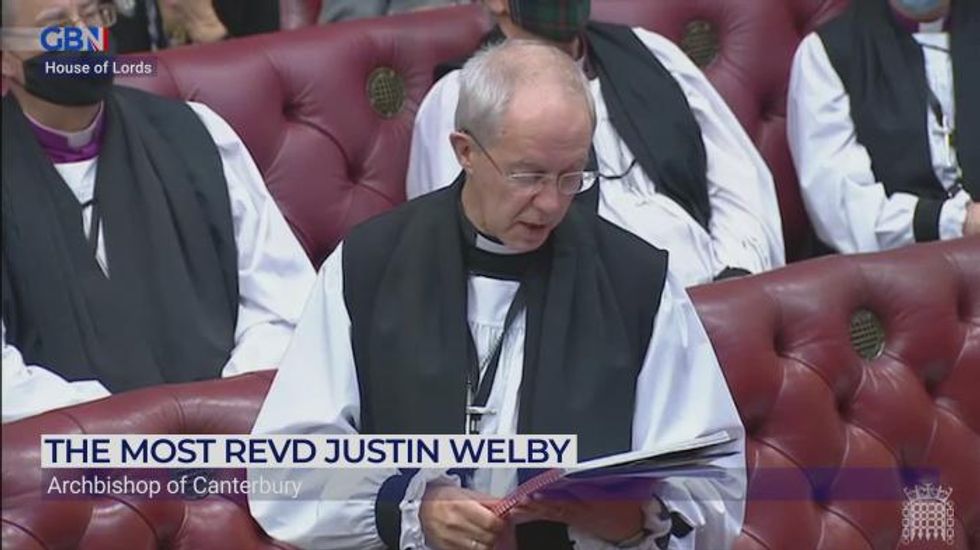Harry Potter author Ms Rowling has attracted strong criticism for comments on gender identity but vehemently denies she is transphobic.
Don't Miss
Most Read
Trending on GB News
The Archbishop of Canterbury was “deeply moved” by hearing of the “intolerance” faced by JK Rowling and academics for their views on gender identity.
The Most Rev Justin Welby made the remark as he raised the “importance of debate and reason” before highlighting comments from Baroness Jenkin of Kennington during a Lords debate on freedom of speech.
Harry Potter author Ms Rowling has attracted strong criticism for comments on gender identity but vehemently denies she is transphobic.
JK Rowling arriving for the opening gala performance of Harry Potter and The Cursed Child, at the Palace Theatre in London.
Yui Mok
She has previously said some women and their families have been “put into a state of fear and distress for no other reason than that they refuse to uncritically accept that the socio-political concept of gender identity should replace that of sex”.
Speaking in the House of Lords, Conservative peer Lady Jenkin warned the last year or so has seen a “troubling increase in intolerance and the so-called cancel culture”.
She said: “A number of recent cases have focused on attempting to silence those who are gender critical – or biological realists.”
Lady Jenkin noted many of them are women who have been “intimidated, harassed and bullied” for “simply expressing opinions that everyone once took for granted – that women are adult human females and biological sex matters”.
She also highlighted abuse aimed at Professor Kathleen Stock and transgender person Deborah Hayton, saying of the latter: “She has defended Professor Stock and written in support of JK Rowling.
“She has little time for what she calls ‘gender identity ideology’. Her views could be summarised in a line from one of her own articles: ‘gender identity is bollocks; you either have them or you don’t.’
“It is fair to say that Hayton divides opinion with such views, but should she not have the right to express them?
“Not according to what she called the ‘transgender thought police’. She may have a point but, while they may police thoughts, they are not necessarily transgender themselves. They use transgender rights to attack and cancel others.”
Lady Jenkin, on why more people do not speak out in support of Ms Rowling and others, said: “This debate is not a dispute between women on one side and trans people on the other.
“Stock and Hayton appear to be on the same side, and are both attacked for making rational arguments. It is not just abuse on social media, as if that were not bad enough.
“Their freedom of speech is threatened in part because their livelihoods are threatened. That is wrong.”
Mr Welby, concluding the debate, said: “I was deeply moved by the long list from Baroness Jenkin of Kennington of those who have suffered from the intolerance that many have been going through, and particularly people like JK Rowling and many academics.
“I think that is something that’s a principle we have to bear in mind as we go forward.”
Prof Stock announced in October she would be leaving the University of Sussex after a “horrible time”.
Her decision came after an anonymous group, reportedly set up by students, launched a campaign to get her sacked amid accusations of transphobia.
Prof Stock has previously said she is “at odds” with a large section of academics as she believes gender identity is not more important than facts about biological sex, “particularly when it comes to law and policy”.
Elsewhere in the debate, Lord Cashman said some of the attacks he has faced for being trans inclusive were “particularly nasty”.
He also highlighted organisations which have been criticised because they “support LGBT+ equality”.
The former EastEnders actor and non-affiliated peer noted how the 17th century Salem witchcraft trials were recently mentioned in the chamber.
Lord Cashman told peers: “As someone who is trans inclusive and has continually defended the rights of trans people to become themselves, defending trans men and trans teenagers and trans women in particular, that I too have felt it is like Salem.”
He also said it was “deeply toxic” to depict trans people, and trans women in particular, as a threat and this “placed them in dangerous territory”.









